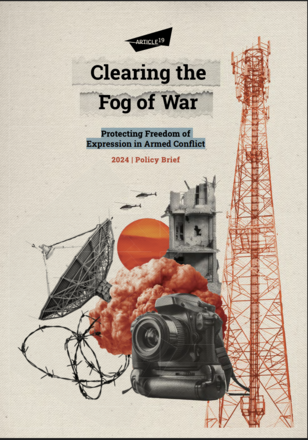
ARTICLE 19’s policy brief underscores the growing urgency of protecting freedom of expression during armed conflict, as compliance with international humanitarian (IHL) and human rights law (IHRL)—and the mitigation of civilian suffering—depend on the free flow of information. Across more than 120 ongoing conflicts, governments and armed groups increasingly suppress expression through surveillance, censorship, disinformation, internet shutdowns, and digital manipulation. Journalists and human rights defenders face escalating threats, while propaganda and hate speech distort narratives and impede peace efforts.
The brief argues that freedom of expression is not a privilege that can be suspended in wartime—it is a safeguard that enables transparency, accountability, and access to life-saving information. Violations persist not due to legal gaps but because of weak enforcement and political unwillingness. Nevertheless, interpretative gaps remain regarding digital threats, cyber operations, and the role of private actors.
To address these challenges, ARTICLE 19 proposes ten guiding principles: reaffirming that free expression protects civilians; ensuring that any restrictions meet legality, legitimacy, necessity, and proportionality tests; recognizing the interplay between IHL and IHRL; and investing in protection before and after conflict. Cyber and information operations must comply with IHL, while responses to disinformation and hate speech should respect freedom of expression. Internet connectivity must be treated as a civilian lifeline, and technology companies should assume responsibility for respecting human rights and IHL.
ARTICLE 19 calls on states, non-state actors, humanitarian organizations, and private companies to integrate these principles into laws, policies, and accountability frameworks. Upholding free expression in wartime is essential to protecting civilians and ensuring respect for international law.
Tags: War reportingThe content of this article can be used according to the terms of Creative Commons: Attribution-NonCommercial 4.0 International (CC BY-NC 4.0) . To do so use the the wording "this article was originally published on the Resource Centre on Media Freedom in Europe" including a direct active link to the original article page.

